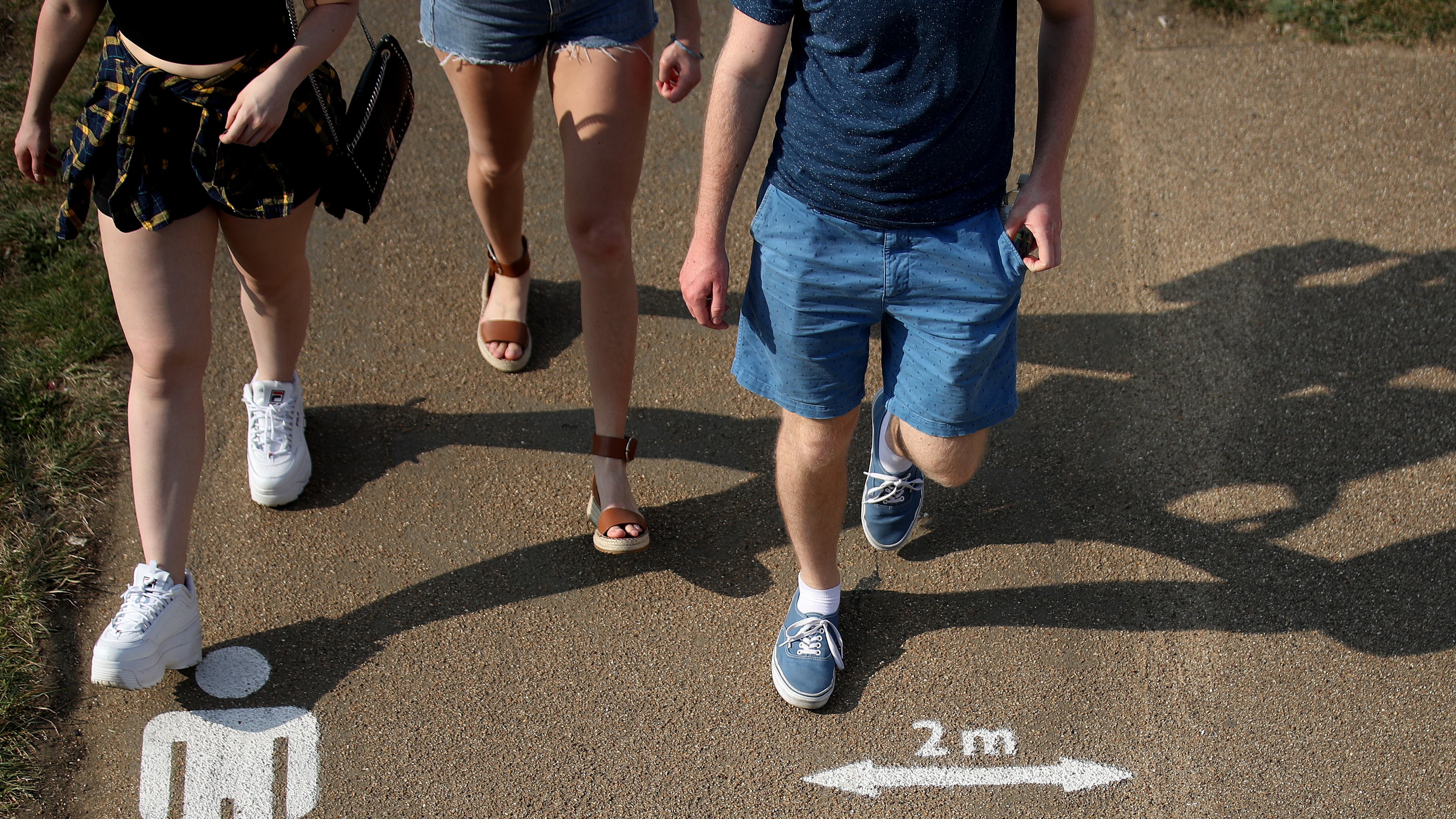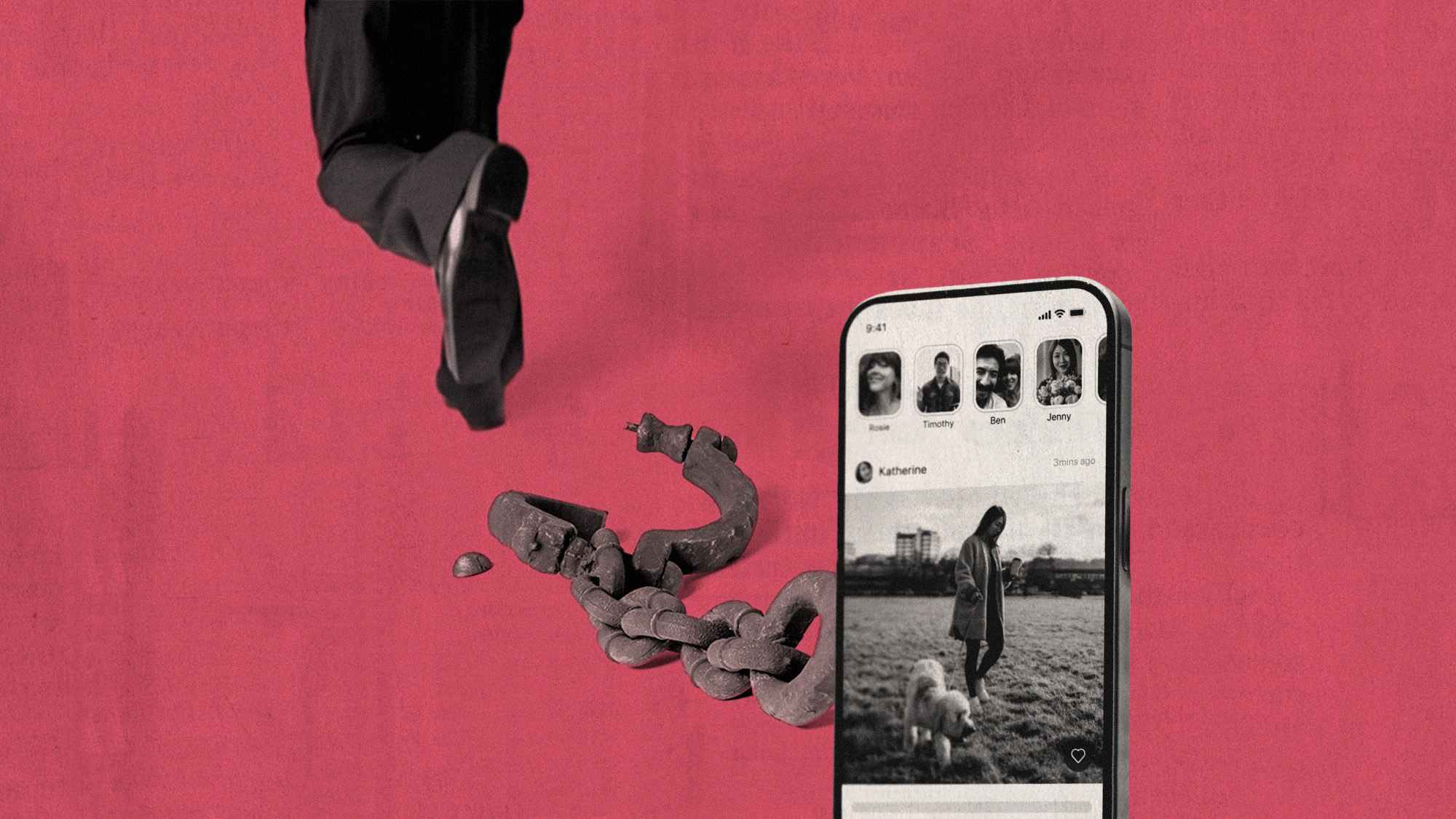Coronavirus: the UK’s contact tracing plan explained
NHS trialling Covid-19 tracking app ahead of nationwide launch

A free daily email with the biggest news stories of the day – and the best features from TheWeek.com
You are now subscribed
Your newsletter sign-up was successful
An NHS app designed to help prevent a second wave of coronavirus infections is being trialled on the Isle of Wight this week.
The app uses Bluetooth to trace close contact between its users, allowing officials to more easily track the potential spread of infections.
Transport Secretary Grant Shapps told the BBC that the government will be asking everyone in the UK to download the app later this month.
The Week
Escape your echo chamber. Get the facts behind the news, plus analysis from multiple perspectives.

Sign up for The Week's Free Newsletters
From our morning news briefing to a weekly Good News Newsletter, get the best of The Week delivered directly to your inbox.
From our morning news briefing to a weekly Good News Newsletter, get the best of The Week delivered directly to your inbox.
Why do we need to track the virus?
Tracking the spread of the virus is a key part of tackling the outbreak, enabling the authorities to ask people who have been in contact with a carrier of the infection to stay at home.
If an app user develops coronavirus symptoms, the disclosure may trigger an anonymous alert to other users with whom they have recently had contact, enabling those people to go into quarantine and potentially be tested.
“The viruses then have nowhere to go,” John Swartzberg, clinical professor emeritus in the infectious diseases and vaccinology division at the University of California, Berkeley’s School of Public Health, told The Verge.
A free daily email with the biggest news stories of the day – and the best features from TheWeek.com
Speaking at the UK government’s daily coronavirus briefing on Sunday, Cabinet Office Minister Michael Gove said: “When it comes to contract tracing, the more people who download the app developed by the NHS, the better.
“Knowing this is a contribution that all of us can make to helping to keep our communities and neighbours safe is a very powerful incentive.”
Experts say that successful use of the app might also result in an earlier lifting of some lockdown measures in the UK, with some other countries softening restrictions after introducing similar contact tracing and virus tracking systems.
Where else has this been done?
Contact tracing is a key part of the lockdown lifting strategy of many other countries, with Australia, India, China and South Korea all opting opted for smartphone tracking systems.
In Australia, “all mobile phone numbers within a 1.5-metre range of the infected person - for 15 minutes or more - will be stored”, reports German news site Deutsche Welle (DW).
In India, the government-backed app “Aarogya Setu” - which translates as “Bridge to Health” in Hindi - uses Bluetooth to check whether anyone in the user’s vicinity has declared coronavirus symptoms.
And people in China can scan physical QR codes with their phones in order to share information about their travel history and health status. These codes must be scanned before boarding trains and buses, entering airports and offices, or even returning home to housing complexes.
“Different colours on the apps indicate different levels of risk, with green codes granted unrestricted movement, yellow codes for seven days of quarantine, and red codes for those who required 14 days of quarantine,” says DW.
South Korea has also launched a track and trace system that runs a coronavirus Smart Management System through smartphones. The scheme has been applauded as a success story in tackling the outbreak.
But, says Quartz, “such data collection is already having unintended consequences. South Korea’s coronavirus-tracking apps have made it possible to suss out the identities of those infected, leading to public shaming.”
Despite widespread concerns about privacy, the authorities in Italy are developing a tracing and tracking app that would trace people who have come into contact with a confirmed coronavirus carrier.
But Germany has ditched plans to launch a similar app, following a backlash after the government abandoned homegrown technology in favour of a solution supported by Google and Apple, reports the Financial Times. And a contact-tracing app in Singapore has only seen around 17% uptake, adds The Sun.
So what exactly are these privacy concerns?
The proposed widespread use of the NHS app has raised concerns about the government and third parties having access to extremely sensitive data about people’s movements and interactions.
In an open letter on publishing platform Medium in March, “responsible technologists” called on the health service and health ministers to ensure that any such tracing app would follow “ethical best practice” - and warned that if corners were cut, public trust would be eroded.
Labour’s Nick Thomas-Symonds has also voiced fears about issues around privacy and security. “There are people for whom location services on their mobile devices are turned off for particular safety reasons,” he told Sophy Ridge on Sky News.
In Germany, “hundreds of academics” signed a letter warning against a government-run app that would see private data held centrally and “catastrophically hamper trust in and acceptance of such an application by society-at-large”, reports the FT.
Using such technology can “give governments and companies a treasure trove of information on our health and movements - and create a precedent to request more later”, says Quartz. “The danger is when the public becomes used to it.”
What about the potential benefits?
Epidemiologists advising the NHS say that about 56% of the UK population - or around 80% of smartphone owners - would need to download and use the health service’s new app in order to help successfully suppress the virus. However, the spread of the disease could still be slowed even if the take-up is lower, they add.
In a paper published earlier this year in the journal Science, University of Oxford researchers suggested that contact tracing apps might be the only effective alternative to mass lockdowns.
The virus is spreading “too fast to be contained by manual contact tracing, but could be controlled if this process was faster, more efficient and happened at scale,” they wrote.
“A contact-tracing app which builds a memory of proximity contacts and immediately notifies contacts of positive cases can achieve epidemic control if used by enough people.”
That message was echoed last week by the deputy chief medical officer for England, Dr Jenny Harries. Comparing tracing to social distancing, she said: “Everybody has to do it together to get it to work.”
-
 Local elections 2026: where are they and who is expected to win?
Local elections 2026: where are they and who is expected to win?The Explainer Labour is braced for heavy losses and U-turn on postponing some council elections hasn’t helped the party’s prospects
-
 6 of the world’s most accessible destinations
6 of the world’s most accessible destinationsThe Week Recommends Experience all of Berlin, Singapore and Sydney
-
 How the FCC’s ‘equal time’ rule works
How the FCC’s ‘equal time’ rule worksIn the Spotlight The law is at the heart of the Colbert-CBS conflict
-
 A Nipah virus outbreak in India has brought back Covid-era surveillance
A Nipah virus outbreak in India has brought back Covid-era surveillanceUnder the radar The disease can spread through animals and humans
-
 A real head scratcher: how scabies returned to the UK
A real head scratcher: how scabies returned to the UKThe Explainer The ‘Victorian-era’ condition is on the rise in the UK, and experts aren’t sure why
-
 How dangerous is the ‘K’ strain super-flu?
How dangerous is the ‘K’ strain super-flu?The Explainer Surge in cases of new variant H3N2 flu in UK and around the world
-
 Covid-19 mRNA vaccines could help fight cancer
Covid-19 mRNA vaccines could help fight cancerUnder the radar They boost the immune system
-
 The ‘menopause gold rush’
The ‘menopause gold rush’Under the Radar Women vulnerable to misinformation and marketing of ‘unregulated’ products
-
 Tips for seizing control of your digital well-being
Tips for seizing control of your digital well-beingThe Week Recommends A handy mix of technology and self-motivation
-
 The new Stratus Covid strain – and why it’s on the rise
The new Stratus Covid strain – and why it’s on the riseThe Explainer ‘No evidence’ new variant is more dangerous or that vaccines won’t work against it, say UK health experts
-
 RFK Jr. vaccine panel advises restricting MMRV shot
RFK Jr. vaccine panel advises restricting MMRV shotSpeed Read The committee voted to restrict access to a childhood vaccine against chickenpox